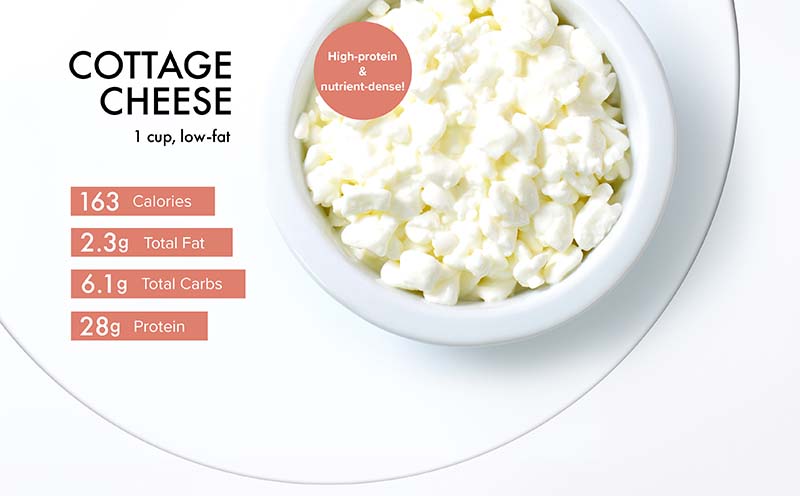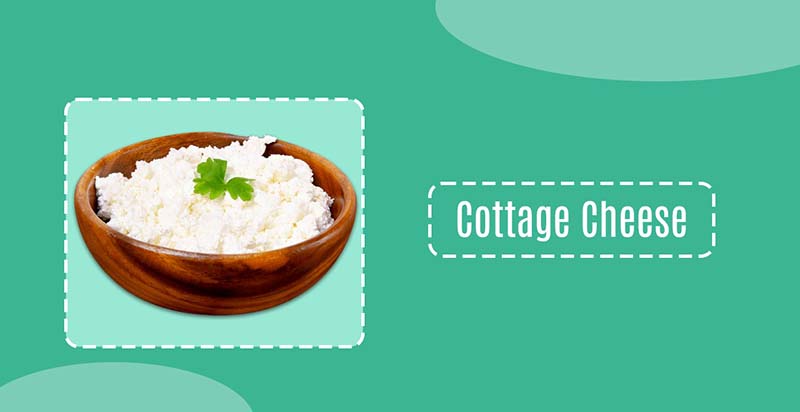In your quest for delicious, nutrient-rich additions to your daily meals that aid in weight loss, you might ask, ‘Is Cottage Cheese Good for Losing Weight?’ This question leads us to the versatile world of cottage cheese. Ideal for both savory and sweet dishes, it’s a key element in many diets.
Beyond being a low-calorie staple in your refrigerator, cottage cheese is lauded for its high protein content and essential nutrients, supporting health goals like weight loss and overall nutrition. Explore the significant role of cottage cheese in promoting health and aiding weight loss and learn how to integrate this powerhouse into your balanced diet.
Related articles
- Are Green Beans Good for Weight Loss? Key Insights.
- Are Lupini Beans Good for Weight Loss? Unveiling the Truth.
- Can Avocado Help You Lose Weight? Unveiling the Truth.
1. Is Cottage Cheese Good for Weight Loss?
Absolutely, incorporating cottage cheese into a weight loss regimen can be quite beneficial. Its low-calorie yet high-protein content plays a key role in satiety, helping to curb hunger with fewer calories, which is crucial for weight management. Moreover, cottage cheese is a good source of calcium, known to assist in fat metabolism, potentially boosting weight loss efforts. Opting for low-fat or fat-free versions is advisable to keep the calorie count in check. Remember, moderation is key, as overconsumption can negate its benefits.
Note: For a balanced approach, consider pairing cottage cheese with fiber-rich foods such as fruits or whole grains. This not only adds variety and flavor but also enhances the feeling of fullness and prolongs digestion, aiding in weight control.

2. Nutrition Facts of Cottage Cheese
Cottage cheese’s nutritional value shifts with variations in milk fat content and sodium levels.
A 113-gram serving of 1% milk fat cottage cheese delivers these nutrients:
- Calories: 81
- Protein: 14 g
- Carbohydrates: 3 g
- Fat: 1 g
- Vitamin B12: 29% of the Daily Value (DV)
- Sodium: 20% of the DV
- Selenium: 19% of the DV
- Riboflavin: 15% of the DV
- Phosphorus: 13% of the DV
- Calcium: 5% of the DV
- Folate: 4% of the DV This portion also contains smaller amounts of vitamin B6, choline, zinc, and copper.
The carbohydrate content in cottage cheese is primarily lactose, which some individuals may find challenging to digest.
For those incorporating higher amounts of cottage cheese into their diet, consider opting for varieties with reduced sodium to mitigate potential blood pressure and heart disease risks due to high sodium intake.
Remarkably, over 70% of the calories in cottage cheese come from protein, making it an excellent choice for those seeking a protein-rich food.

3. Potential Weight Loss Benefits of Cottage Cheese
Cottage cheese is a robust ally in weight management due to several key features that align with weight loss strategies.
Low Caloric Content
At approximately 206 calories per cup, cottage cheese is a low-calorie champion in the diet world. Its calorie count, however, can fluctuate slightly based on fat content and curd size. Nonetheless, it remains a preferred choice for calorie-conscious individuals.

Low Carbohydrate Levels
With only about six to eight grams of carbohydrates per cup, cottage cheese suits those on low-carb or ketogenic diets well. This minimal carbohydrate content can assist in maintaining steady blood sugar levels, benefiting everyone from the health-conscious to individuals managing prediabetes or diabetes.
High Protein Content
Boasting around 24 grams of protein per cup, primarily from casein, cottage cheese is a protein powerhouse. This high protein content is invaluable for prolonging satiety, aiding in weight management, and supporting muscle maintenance during weight loss. It’s also an excellent supplement for those engaged in regular physical activity.
Presence of Beneficial Bacteria
Select cottage cheese varieties are enriched with probiotics, the beneficial bacteria supporting gut health. These active cultures can enhance digestion, fortify the immune system, and contribute to overall health. While the probiotic content varies among brands and types, incorporating cottage cheese with probiotics can provide these supplementary health benefits.
4. Additional Benefits of Cottage Cheese
Cottage cheese brings an array of health advantages to humans’ overall health and well-being, supporting everything from muscle synthesis to bone integrity.
Facilitates Muscle Growth
Cottage cheese has long been favored by athletes and fitness enthusiasts for its affordability, convenience, and rich protein content. Consuming casein-rich cottage cheese before bedtime, especially after an evening workout or strenuous physical training, may enhance muscle recovery and growth by increasing amino acid availability during sleep and decreasing muscle protein breakdown. This has been shown to lessen exercise-induced muscle damage. Additionally, dairy products like cottage cheese are noted for their role in preserving muscle mass, especially crucial as we age.
Promotes Bone Health
Cottage cheese is beneficial for bone health due to its calcium and phosphorus content. Calcium is vital for maintaining strong bones and reducing the risk of osteoporosis, a condition characterized by weak and fragile bones. Phosphorus, another mineral abundant in cottage cheese, is key to robust and dense bones. Moreover, the protein in cottage cheese is known to help mitigate bone loss and lower fracture risks in older adults.
5. Possible Drawbacks of Cottage Cheese in Weight Loss
Being informed about potential negatives helps in making balanced dietary choices, especially in weight management.
Elevated Sodium Levels
Some cottage cheese varieties are high in sodium, which could be problematic for individuals with salt sensitivities or hypertension. High sodium intake is associated with increased blood pressure and heightened risk of heart disease. If you don’t have salt sensitivity or a related condition, cottage cheese’s sodium content might not pose a significant issue. However, consulting with healthcare professionals is advisable for those concerned about sodium intake.
Fat Content
Cottage cheese is available in both full-fat and low-fat varieties. Full-fat cottage cheese generally contains about nine grams of fat per cup, offering a richer texture and flavor. In contrast, low-fat varieties hold about three to four grams per cup. While the fat in cottage cheese isn’t directly linked to increased health risks for healthy individuals, those on a low-fat diet might prefer the low-fat option.

Potential Intolerance or Allergies
As a dairy product, cottage cheese contains lactose, which might cause digestive discomfort for those with lactose intolerance or dairy allergies. While fermented dairy products like cottage cheese usually have lower lactose levels, some individuals might still react due to casein or whey protein sensitivities. If you suspect a dairy intolerance or allergy, seek advice from a healthcare professional before incorporating cottage cheese into your diet.
6. Is Cottage Cheese or Yogurt Better for You?
When it comes to nutrition, plain Greek yogurt is often compared to cottage cheese due to their similar profiles: both are low in calories (especially the 0-2% fat versions), packed with protein, rich in calcium, free from added sugars, and have reduced lactose levels. Cottage cheese and Greek yogurt stand out as superb choices for a wholesome snack. The decision between them boils down to individual taste and texture preferences. Cottage cheese is your go-to for a milder taste and more distinct texture, while Greek yogurt offers a creamier, denser consistency with a tangy edge.
Note: For an extra health boost, consider adding fresh fruits, nuts, or seeds to either cottage cheese or Greek yogurt. This not only enhances flavor and texture but also increases the nutritional value by adding vitamins, minerals, and fiber. Plus, these additions can make your snack more satisfying and sustaining. Always opt for the plain varieties of either option to avoid added sugars and control the quality of toppings you add.

Conclusion
Diving into the world of dietary choices with the query “Is Cottage Cheese good for losing weight?” reveals that yes, cottage cheese is a beneficial food for those looking to manage weight. Its low-calorie and high-protein characteristics make it a nutritious and versatile choice for a balanced diet.
While considering its sodium and fat content is important, as well as understanding your body’s reaction to lactose, cottage cheese overall offers a tasty, healthful option. Your journey and experiences with weight management are invaluable to us, so feel free to share your cottage cheese stories! And for a continued exploration of health and wellness, don’t forget to visit more blogs from HealthConnect. Your path to well-being is enriched with every shared experience and new information.

Dr. Joyce Slater: Your Guide to Informed Health Choices
Dr. Joyce Slater shines as a distinguished expert in the field of nutrition and public health. Contributing her vast expertise to HealthConnectbc, she embodies a deep-seated passion for enhancing public well-being. As a respected figure in her field. Dr. Slater’s academic journey and professional achievements are nothing short of inspirational.
Holding a significant position as a researcher and educator, Dr. Slater has delved deeply into the intricacies of food literacy and nutritional science. Her work, prominently featured in numerous esteemed scientific publications, underscores her dedication to expanding our understanding of food’s role in health and society.
At the heart of Dr. Slater’s professional ethos is a profound desire to positively impact individual lives through education and research. She often says, “Empowering people with the knowledge to make healthier choices is the most rewarding aspect of my work.” This principle is the cornerstone of her involvement with HealthConnectbc, where she strives to provide reliable and practical health advice.
Dr. Slater’s contributions to HealthConnectbc are multifaceted: academically, she offers insights into the complex world of nutrition and health, enhancing both public understanding and professional practices. Additionally, she is instrumental in guiding and inspiring the next generation of health professionals, thus fostering future excellence in the field.
Juggling rigorous research with her educational duties, Dr. Slater demonstrates an unwavering commitment to her profession. Her approachable nature and genuine concern transcend the confines of academia, touching the lives of everyone she interacts with. Dr. Slater looks forward to continuing her journey of discovery and education, dedicated to the ongoing improvement of public health and nutrition.
At HealthConnectbc, Dr. J. Slater is not just a contributor; she is a guiding light, dedicated to enlightening and motivating individuals towards a healthier and more informed lifestyle.
PUBLISHED ARTICLES
- Food literacy competencies: A conceptual framework for youth transitioning to adulthood (2018)
- Self-perceived eating habits and food skills of Canadians (2016)
- Challenges to acquiring and utilizing food literacy: Perceptions of young Canadian adults (2016)
- Socio-demographic and geographic analysis of overweight and obesity in Canadian adults (2009)
- Sustainable well-being: Concepts, issues, and educational practices (2014)


